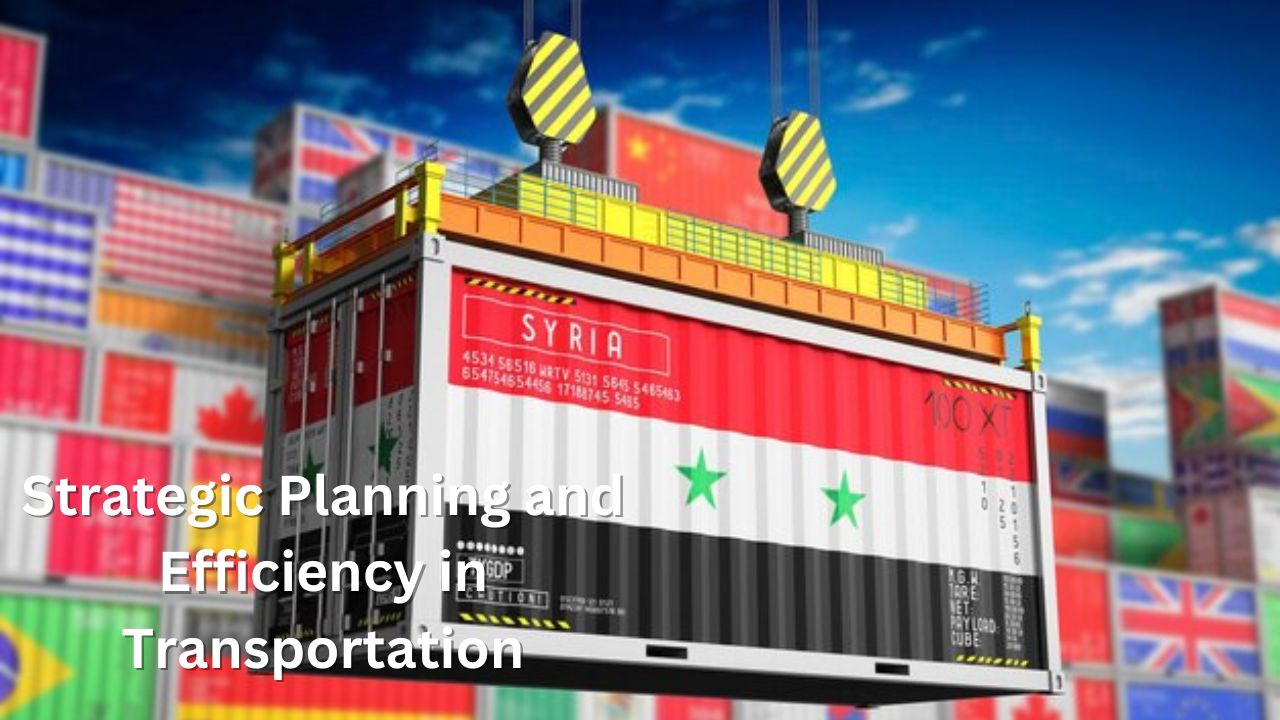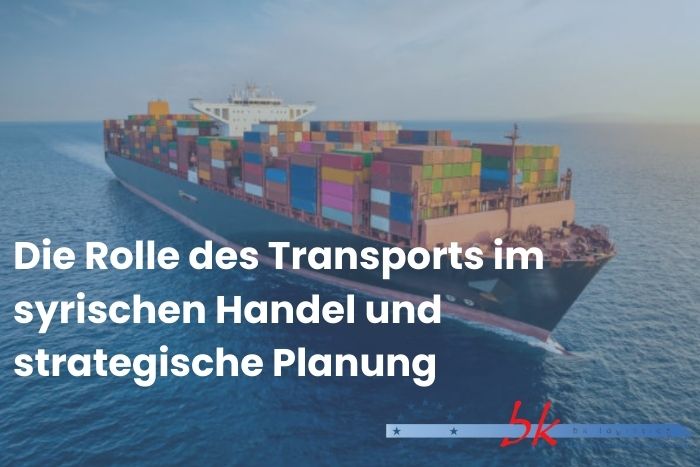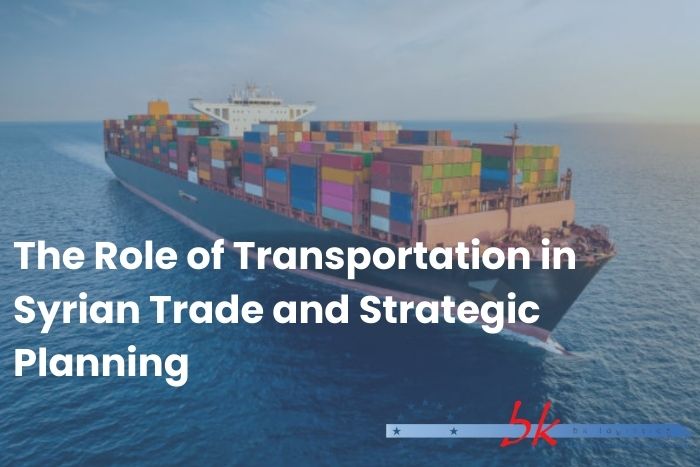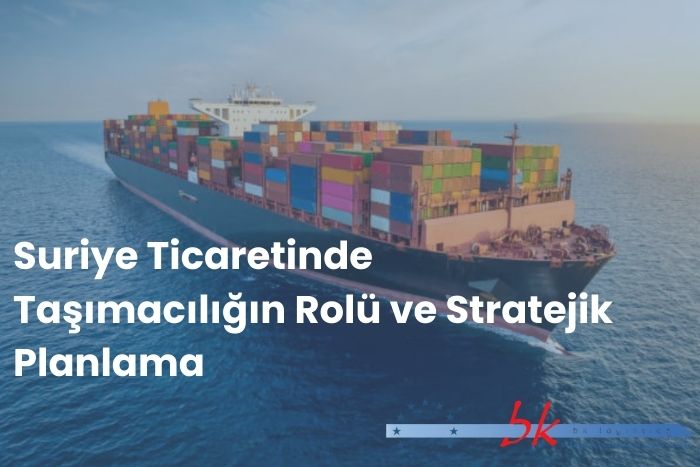News
The Role of Transportation in Syrian Trade and Strategic Planning
Although Syria is located in one of the most strategic regions of the Middle East, it has faced political and economic challenges in recent years. Nevertheless, Syria’s geographical location, with its accessibility by sea and land, offers significant opportunities for potential trade routes. The logistics sector, particularly transportation, plays a vital role in Syria’s reconstruction and economic development. This content will explore in detail the role of transportation in Syrian trade and the importance of strategic planning.
Syria’s Geographical Location and Strategic Advantages in Transportation
Syria is situated in the northeast of the Middle East and serves as a key transit point for trade routes between Asia, Europe, and Africa. This strategic location positions Syria as a logistics hub. The country has a coastline along the Mediterranean Sea in the west, making sea transportation significant. At the same time, it offers important routes for land transportation. Via road networks, Syria connects to countries like Turkey, Lebanon, Jordan, Iraq, and Egypt, potentially playing a pivotal role in reshaping regional trade.
The effective use of infrastructure elements such as ports, roads, and railways in the transportation sector could reinforce Syria’s role in trade routes. Ports and airports present significant opportunities to revitalize not only Syria’s domestic trade but also its foreign trade. With its Mediterranean coast, Syria can use ports to transport goods quickly to other Middle Eastern countries. These geographical advantages will form the foundation of Syria’s future trade strategies.
The Impact of Transportation on Syria’s Economy
Transportation plays a crucial role in a country’s economic growth by enhancing the speed and efficiency of trade, thereby boosting economic activities. The effectiveness of transportation in Syria directly impacts not only domestic trade but also foreign trade. Syria’s ports, roads, and airports can enhance the country’s international trade capacity and accelerate regional economic development.
Transportation forms the backbone of trade by enabling the movement of goods and services from one place to another. The transport of materials and resources supports production processes swiftly, accelerating economic growth. Additionally, the transportation sector has the potential to create jobs. A developed logistics infrastructure offers employment opportunities and can increase local workforce participation. This accelerates economic development within Syria while facilitating integration into global trade networks.
The Relationship Between Transportation and Trade, and International Exports
Transportation significantly affects Syria’s foreign trade capacity. An increase in Syria’s foreign trade is directly tied to the right transportation strategies and infrastructure. For international trade to grow, the gateways to the outside world must be utilized efficiently. Syria’s existing ports offer substantial potential for revitalizing regional and global trade.
Exports are a vital factor in a country’s economic growth, and transportation can accelerate this process. Given Syria’s current potential, improving transportation infrastructure will boost international trade. Mediterranean ports will play a critical role in speeding up exports, particularly to the Middle East, Europe, and North Africa. Likewise, integrating air transportation and railways will enhance Syria’s export capacity and contribute to faster trade.
Strategic planning is critical to ensuring all transportation-related processes are carried out efficiently. Strategic planning in Syria’s transportation sector goes beyond infrastructure investments and transport routes. The digitalization of transportation processes will also effectively enhance operational efficiency. Digital systems can be used to optimize transport routes, improve cargo tracking, and reduce transportation times.
To increase efficiency in Syria’s transportation sector, the focus should first be on infrastructure investments. Modernizing ports, roads, and airports will speed up transportation processes and help revive international trade. Additionally, the use of digital systems will make logistics processes more efficient. Such strategic planning will contribute to the development of both local and global trade.

Security in Transportation and Its Contribution to the Syrian Economy
Security in transportation is vital for the healthy growth of Syria’s trade. Security measures affect not only the speed of transportation but also the safety of trade. High-risk areas in Syria make it challenging to provide logistics services securely. Secure transportation solutions play a critical role in Syria’s economic growth and the acceleration of foreign trade.
Security in the transportation sector is not limited to road and sea transport; the secure integration of air transportation and railways is also of great importance. Effectively implementing security measures will accelerate Syria’s integration into global trade networks. This process also ensures the safe revitalization of trade in the region.
The future of Syria’s logistics and transportation sector plays a crucial role in the country’s economic development and the revival of its trade. Syria’s geographical advantages and strategic location, combined with the right transportation strategies, could pave the way for it to become a significant hub in global trade. Investments in transportation, infrastructure improvements, and strategic planning will enable Syria to make substantial contributions to regional and global trade. Integrating digitalization and security measures will enhance transportation efficiency and facilitate renewed economic growth in Syria.
Innovative Solutions in Logistics and Future-Oriented Investments
Syria’s logistics sector holds great potential due to existing infrastructure deficiencies and the need to revive trade. However, realizing this potential requires first strengthening the logistics infrastructure. Innovative logistics solutions can not only accelerate transportation processes but also significantly reduce costs. Digitalization, artificial intelligence, and sustainable transportation solutions will play a key role in Syria’s future trade strategies.
Digitalization is one of the most important factors in making the logistics sector more efficient and transparent. In particular, smart transportation systems, e-commerce, and cloud-based management systems, such as digital solutions, offer significant opportunities to modernize Syria’s transportation sector. These systems provide logistics companies and consumers with faster, safer, and more economical transportation methods. Additionally, digitally tracking transportation processes can optimize delivery times and increase trade efficiency.
Artificial intelligence enables more efficient route planning and cargo tracking in the logistics sector. AI-based algorithms optimize transportation routes, avoid traffic congestion, and ensure cargo reaches its destination quickly and safely. Moreover, machine learning and AI allow logistics companies to make better forecasts and prepare for future demand fluctuations. Such innovative solutions significantly contribute to the development of Syria’s logistics infrastructure.
Another key area of development in Syria’s transportation sector is sustainable transportation. Environmentally friendly transportation solutions will be critical for Syria to achieve stronger integration into international trade. Electric vehicles, renewable energy-powered transportation systems, and logistics solutions that reduce carbon emissions offer significant opportunities for both environmental protection and cost reduction. These sustainable solutions not only benefit the environment but are also necessary to meet the rising sustainability standards of global trade.
Future investments in Syria’s logistics sector should not be limited to infrastructure improvements. Investments in innovative transportation solutions and digitalization will also play a crucial role. These investments will not only modernize Syria’s logistics sector but could also serve as a model for other countries in the region. The investments will revitalize trade in the region and increase Syria’s trade capacity. Furthermore, the resurgence of regional and global trade will support Syria’s economic development and enhance regional stability.
Syria’s logistics sector has significant development potential. Innovative solutions, digitalization, sustainable transportation, and strategic planning will enable Syria to become a key hub in global trade. For this process to succeed, local and international stakeholders must collaborate in the areas of infrastructure, security, digitalization, and sustainability. Investments in Syria’s logistics sector will contribute not only to the country’s economic growth but also to that of the Middle East.



